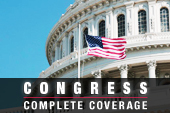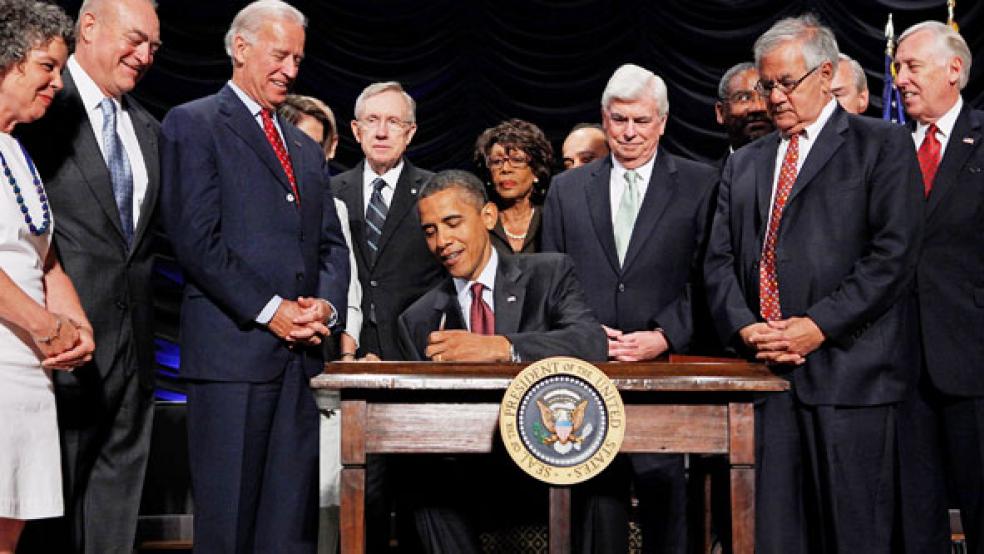At its two-year anniversary , the Dodd-Frank financial reform remains a work in progress: there are more than a hundred rules not yet finalized, deadlines blown by federal regulators, potentially tough legal challenges ahead, and an economy still haunted by deep insecurities.

Enforcing the law has proven just as arduous for President Obama as passing it against stiff Republican opposition in 2010. Dodd-Frank was passed in the aftermath of the worst economic crisis since the Great Depression, a massive overhaul designed to end future bailouts of Wall Street firms and close the regulatory gaps that let problems with subprime mortgages fester into a brutal recession.
Key elements are clouded by questions about the final status of the 298-page proposed Volcker Rule — meant to restrict trading by banks—and which hedge funds, private equity firms and insurance companies the government will begin regulating as systemic risks to the economy.
“When it comes to Dodd-Frank, stakeholders are still confused and frustrated, and begging to be told what is expected of them,” said Sen. Pat Roberts, R-Kan., at an Agriculture Committee hearing Tuesday. “Here we are two years later and we still have no plan.”
Republican presidential nominee Mitt Romney has vowed to repeal the law, claiming it has saddled companies with excessive oversight.
The complaints have aggravated many in the corridors of the White House and Treasury Department, with a senior administration official countering that they’ve succeeded given the enormity of the task. There are 398 new rules, a new Consumer Financial Protection Bureau, and a requirement that the largest banks submit ‘living wills’ to the government in the event they need to be unwound.
Top financial institutions have repaired their balance sheets and new safeguards exist to stop a repeat of the economic meltdown that struck four years ago, said the official, speaking on background in advance of the Dodd-Frank anniversary on July 21.
Even if the financial sector has become safer under the law, the millions of voters still coping with unemployment and depressed home values don’t yet ‘feel’ the benefits of the act. Not surprisingly, Republican presidential nominee Mitt Romney has vowed to repeal a law that he claims has stifled the recovery.
Where the White House sees reason to celebrate, critics see chaos.
“We’re certainly no longer in a crisis of the industry, but what Dodd-Frank has succeeded in doing is replacing the financial crisis with a regulatory crisis,” said Wayne Abernathy, executive vice president for financial institutions policy and regulatory affairs at the American Bankers Association. “Most of the work in implementing Dodd-Frank is in front of us, instead of behind us.”
Instead of monitoring companies, as they should, regulators are trapped in a maze of rule writing while vetting thousands upon thousands of comment letters from trade groups and consumer advocates, Abernathy said.
Because so much of the regulation involves subjective judgments about bank practices, Abernathy said there is no end point for the implementation process, “It’s like downtown Manhattan—it will never be finished.”
Federal regulators have blown more than 63 percent of the rulemaking deadlines set by the law, according to the law firm Davis Polk & Wardwell. It’s the consequence of balancing the mandate for stricter oversight with concerns about not disrupting the markets, a goal that administration officials say is far more important than speeding through the process to stay on schedule.
Tony Carfang, a partner at the consulting firm Treasury Strategies, claims that Dodd-Frank has worsened the hiring picture, since companies are uncertain about whether they will be able to borrow enough in the short-term, so they are hoarding almost $2 trillion in cash on their balance sheets that could instead pay for expansion and new workers.
A slew of financial scandals in recent months has not engendered more trust in the newly empowered agencies, namely the $5.8 billion trading loss at JPMorgan Chase, the British bank Barclays others rigging the benchmark London Interbank Offered Rate (LIBOR), and the implosion of the futures brokerages MF Global and Peregrine Financial Services.
The Federal Reserve Bank of New York first learned the LIBOR—an interest rate that often serves as the basis for U.S. mortgages—was being manipulated in 2007, yet when asked why the government has not acted more quickly Fed Chairman Ben Bernanke told the Senate Banking Committee on Tuesday that the nation’s central bank “has no ability to change” how the rate is set.
The 2010 legislative victory now looks somewhat pyrrhic as House Republicans block requests for an additional $323 million in combined funding next year for the Commodity Futures Trading Commission and the Securities and Exchange Commission, two agencies with beefed-up responsibilities under Dodd-Frank.
The difference between the requested funding and what GOP lawmakers are offering is the equivalent of 700 employees at the CFTC and 900 at the SEC, according to a presentation circulated by the Treasury Department. As a result, the agencies are simultaneously getting blasted for blown deadlines while scrounging for money to implement Dodd-Frank, a no-win scenario that its architect Rep. Barney Frank, D-Mass., called last month “a declaration of unilateral surrender to the forces of irresponsibility that wrecked our economy.”
At the same time, the law is undergoing an attack in court after U.S. Circuit Judge Douglas Ginsberg ruled last summer that the SEC had not properly weighed the costs and benefits of rules from Dodd-Frank. Following that victory for the Business Roundtable, a trade association of CEOs, the U.S. Chamber of Commerce and trade groups representing Wall Street have since filed suits on similar grounds.
Dennis Kelleher, president and CEO of the advocacy group Better Markets, warned the Senate Agriculture Committee Tuesday that the court gutting Dodd-Frank on technical grounds poses the gravest of uncertainties for Americans—another economic disaster that sucks trillions of dollars out of the economy. Market transparency and the benefits of avoiding a financial crisis simply can’t be easily quantified by the government, he said.
“Cost benefit analysis sounds good in theory,” Kelleher said, “but it’s often a catastrophe in reality and its detail.”




